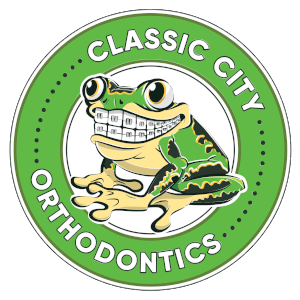Your Treatment Experience
General Soreness
When you get your braces on, you may feel general soreness in your mouth and teeth may be tender to biting pressures for three to five days. Rinsing your mouth with a warm salt-water mouthwash can relieve this soreness. Dissolve one teaspoonful of salt in 8 ounces of warm water and rinse your mouth vigorously. If the tenderness is severe, take Ibuprofen or Tylenol in the recommended dosage every 4-6 hours. We also provide bite wafers to exercise your teeth and work out the soreness. The lips, cheeks, and tongue may also become irritated for one to two weeks as they toughen and become accustomed to the surface of the braces. You can put wax on the braces to lessen this. We’ll show you how!
Loosening of Teeth
A feeling of loose teeth is to be expected throughout treatment. Don’t worry! It’s normal. Teeth must loosen first so they can be moved. The teeth will again become rigidly fixed in their new corrected positions.
Loose Wire or Band
Don’t be alarmed if a wire or band comes loose. This happens occasionally. Please call our office to describe the situation and receive instruction. In the meantime, here are some helpful tips to get you by until the pros can take care of you.
- Pokey: This is not just the famous friend to “Gumby”! If a wire protrudes and is irritating, use a blunt instrument (the back of a spoon or the eraser end of a pencil) and carefully, gently push the irritating wire under the arch wire. Simply get it out of the way. If irritation to the lips or mouth continues, place orthodontic wax on the wire to reduce the annoyance. Call our office as soon as possible for an appointment to check and repair the appliances. If any piece comes off, save it and bring it with you to the office.
- Brokey: No this is not your wallet! It’s a broken brace. Call our office immediately! We will arrange a repair visit, or at least a comfort visit. You can place wax on the broken brace to stabilize it (if it’s still attached to the orthodontic wire), or bring it to us for repair or replacement.
Care of Appliances
To successfully complete the treatment plan, you must work together with your CCO Team. The teeth and jaws can only move toward their corrected positions if you consistently wear the rubber bands, headgear, or other appliances as prescribed. Damaged appliances lengthen the treatment time. For an introduction to caring for your braces, click here.
Brushing
It’s more important than ever to brush regularly when you have braces so the teeth and gums are healthy after orthodontic treatment. Patients who do not keep their teeth clean may require more frequent visits to the dentist for a professional cleaning. Adults who have a history of gum disease should also see a periodontist during orthodontic treatment.
Athletics
If you play sports, it’s important that you consult us for special precautions. A protective mouth guard is advised for playing contact sports. We can provide mouth guards that work with your braces. For those who are not yet in braces, there are many inexpensive mouth guards on the market that protect your smile. In case of any accident involving the face, check your mouth and the appliances immediately. If teeth are loosened or the appliances damaged, phone at once for a team member to contact you. In case of bleeding or trauma to the lip or face, stay calm, place ice to control the bleeding/swelling, and seek help from us or the Emergency Department of the hospital.
If you have suffered the loss of a tooth from the mouth, gently clean it off, keep it moist in your mouth. If possible, replace it in the socket or hold it in your mouth, and bring it to your caregiver. In the meantime, treat your discomfort as you would treat any general soreness.
Eating with Braces
What can you eat? Let’s talk about what you shouldn’t eat! If you’ve been wanting to drop a few pounds, the first week wearing braces is just your chance! For the first day or so, stick to soft foods, but exercising your teeth frequently by chewing will reduce the degree of pain and its duration. Avoid tough meats, hard breads, and raw vegetables. Before long, you’ll be able to bite a cucumber again. But you’ll need to protect your orthodontic appliances when you eat for as long as you’re wearing braces.
Foods to Avoid
- Chewy foods: bagels, hard rolls, licorice
- Crunchy foods: popcorn, ice, chips
- Sticky foods: caramels, gum
- Hard foods: nuts, candy
- Foods you have to bite into: corn on the cob, apples, carrots
- Chewing on hard things (for example, pens, pencils or fingernails) can damage the braces. Damaged braces will cause treatment to take longer.
